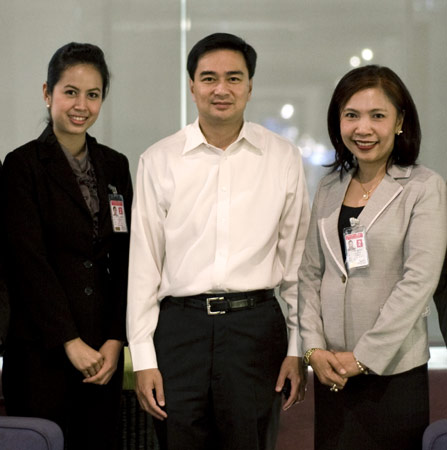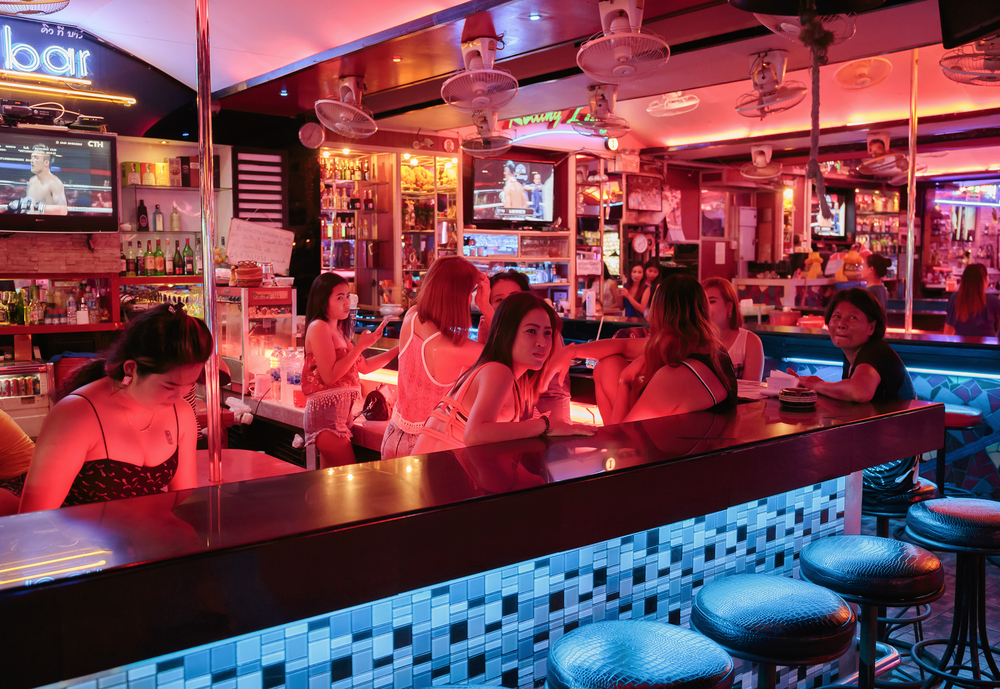Business Culture: Women in Business
Thai women enjoy more freedoms than many of their Southeast Asian counterparts and are legally protected from discrimination in most fields. In practice, however, male chauvinist attitudes prevail; women are lauded and respected for motherhood, yet vulnerable to abuse. People trafficking, domestic violence, and spousal rape are serious problems. Women are highly visible in public settings such as malls, colleges, and workplaces, but tend to be employed in low-end jobs and are underrepresented in politics. Thai attitudes to women are partly affected by locality and social status. Older, wealthier men may take a second "minor wife," implying a mindset of sexual acquisition and objectification. Rural tribesmen are less likely to allow their wives and daughters to work, whereas numerous career women populate the major metropolises.
Public Presence
In most cases, the genders integrate in both the public and private spheres, although bars and nightclubs are sometimes viewed as masculine domains. The prevalence of sex tourism in cities such as Bangkok and Pattaya means that many young Thai women who attend bars alone are likely working as prostitutes. In tribal or Muslim homes, men and women remain separate, and in certain Buddhist temples men and women occupy separate areas.
Women’s fashion differs from locale to locale. Rural females in the lowlands wear the traditional pha sin (tube skirt) dress while their urban counterparts wear Western skirts, jeans, crop tops, high heels, and the like. Thai women typically cover their shoulders, upper arms, and upper legs in light, loose-fitting cotton or linen clothing that "breathes" in the heat and humidity. You'll be able to reduce unwanted attentions from men by following suit. Bright colors are common, but so are black and gray. In the business setting, smartness and elegance are the watchwords to adhere to. Black or blue business suits or dresses in conservative cuts and nicely polished shoes will meet the case. Hosiery is optional.
While there is nothing to stop Thai women from walking the streets alone, they usually prefer to do so with other women. You are free to move about alone or with the companion(s) of your choice, though for safety reasons, heading out with another person is advisable. Avoid going to bars and nightclubs alone, as you may be mistaken for a prostitute. In general, though, Thais are quite used to tourists, so you should be able to move about fairly easily.
Personal Interaction
Casual hand-holding between members of the same sex is acceptable in public, but not between a male and female. Touching anyone’s head (the home of the soul) is considered to be extremely rude. It is also bad manners to make anything but the briefest eye contact with a Thai man or woman. All Thais tend to speak indirectly to each other lest they cause offense and loss of face, a result of which is the country's nickname, the "Land of Smiles." Women addressing men are no exception to this rule, and Thai women tend to adopt a passive tone and compliant vocabulary. While a household is technically headed by a man, his wife makes key decisions about domestic and family matters.
The habit of Thai men to simultaneously revere and debase women creates a complex set of expectations. While many Thai men commit adultery, they look down on the "lower class" of women who prostitute themselves to foreigners. Although he will keenly listen to his mother’s advice, a Thai man has less time for the thoughts and feelings of his wife or girlfriend. The legality of rape within marriage and the ubiquity of domestic violence would suggest that women are not respected in general. There is also a cultural expectation that a couple’s youngest daughter will look after them in old age, and then inherit the family home when they die. A woman cannot be ordained as a bikkhuni (Buddhist monk), whatever her social background. Poverty condemns thousands of women to prostitution (a major plank of the national economy), or menial industrial or agricultural work. Metropolitan upper-class women, on the other hand, have the means to study, travel abroad, buy and sell property, and work in a rewarding profession. In general, Thai men will assume that, as a foreign female, you will have benefited from upper-class rights and privileges, and treat you accordingly.
Autonomy and Leadership
Under Thai law, there are no restrictions on women regarding travel. Theoretically, there are no obstacles to women owning property. In practice, however, the government often only permits the head of a household to acquire property, and most households are headed by men. An increasing number of women are owning and running businesses, but the total remains small. Females are barred from joining the police and the military, but dominate such sectors as education and sales. Women generally decide whom they wish to marry after obtaining their parents’ permission. Aside from that, their ability to make life decisions and plans is dependent on their economic class. Both parents have equal statutory rights over their children, but divorce courts often award the father custody. Traditional male prejudices about the capabilities of women mean that the majority of parliamentary seats are held by men. In government and the civil service, the evidence indicates that women are consistently overlooked for promotion. This may mean that you are taken less seriously than your male colleagues, even if you are the head of your delegation. In this case, it may prove helpful to emphasize your position in the company and have a letter of support from your CEO on hand.
Article written for World Trade Press by Tom Sykes.
Copyright © 1993—2025 World Trade Press. All rights reserved.

 Thailand
Thailand 
